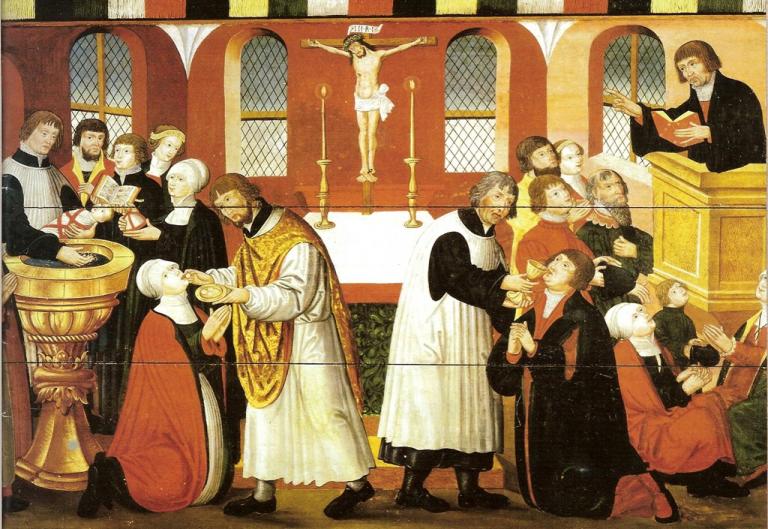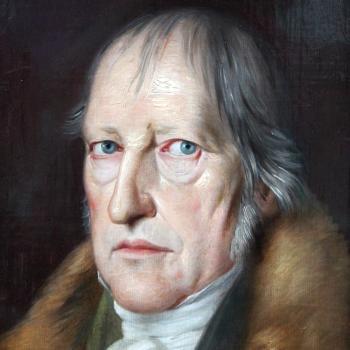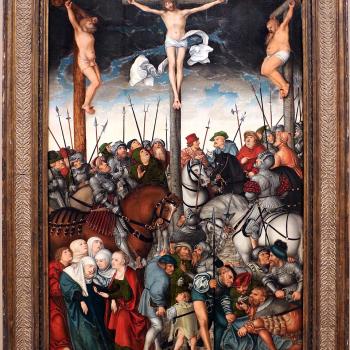Onsi Kamel grew up as an evangelical but became highly attracted to Roman Catholicism. In time, though, he discovered that what had attracted him so much about Catholicism could not necessarily be found in the Roman Catholic Church. And that it could be found in the theology of the Protestant Reformation.
He tells his story in an article Catholicism Made Me Protestant, published, somewhat surprisingly, in First Things. He tells about his love for the Church Fathers and then his discovery that the Church of Rome does not necessarily hold to what they said. He greatly appreciated the writings of Cardinal Newman, the Anglican pioneer of Anglo-Catholicism who then took the step of going over to Rome, which made a saint of him. But Kamel became concerned with Newman’s notion of the “development of doctrine,” which teaches that doctrine really can change. But that didn’t fit with the universal revelation that he was looking for in Catholicism. Nor did today’s conflict between liberal and conservative Catholics correspond with his ideal of a single, unified Magisterium. From the article (my bolds):
Martin Luther, John Calvin, Richard Hooker, Herman Bavinck, Karl Barth—they wrestled with the concerns of the Church catholic and provided answers to the questions Catholicism had taught me to pose. Richard Hooker interpreted the Church’s traditions; Calvin followed Luther’s Augustinianism, proclaimed the visible Church the mother of the faithful, and claimed for the Reformation the Church’s exegetical tradition; Barth convinced me that God’s Word could speak, certainly and surely, from beyond all created realities, to me.
Catholicism had taught me to think like a Protestant, because, as it turned out, the Reformers had thought like catholics. Like their pope-aligned opponents, they had asked questions about justification, the authority of tradition, the mode of Christ’s self-gift in the Eucharist, the nature of apostolic succession, and the Church’s wielding of the keys. Like their opponents, Protestants had appealed to Scripture and tradition. In time, I came to find their answers not only plausible, but more faithful to Scripture than the Catholic answers, and at least as well-represented in the traditions of the Church.
The Protestants did more than out-catholic the Catholics. They also spoke to the deepest needs of sinful souls. I will never forget the moment when, like Luther five hundred years earlier, I discovered justification by faith alone through union with Christ. I was sitting in my dorm room by myself. I had been assigned Luther’s Explanations of the Ninety-Five Theses, and I expected to find it facile. A year or two prior, I had decided that Trent was right about justification: It was entirely a gift of grace consisting of the gradual perfecting of the soul by faith and works—God instigating and me cooperating. For years, I had attempted to live out this model of justification. I had gone to Mass regularly, prayed the rosary with friends, fasted frequently, read the Scriptures daily, prayed earnestly, and sought advice from spiritual directors. I had begun this arduous cooperation with God’s grace full of hope; by the time I sat in that dorm room alone, I was distraught and demoralized. I had learned just how wretched a sinner I was: No good work was unsullied by pride, no repentance unaccompanied by expectations of future sin, no love free from selfishness.
In this state, I picked up my copy of that arch-heretic Luther and read his explanation of Thesis 37: “Any true Christian, whether living or dead, participates in all the blessings of Christ and the church; and this is granted him by God, even without indulgence letters.” With these words, Luther transformed my understanding of justification: Every Christian possesses Christ, and to possess Christ is to possess all of Christ’s righteousness, life, and merits. Christ had joined me to himself.
I had “put on Christ” in baptism and, by faith through the work of the Spirit, all things were mine, and I was Christ’s, and Christ was God’s (Gal. 3:27; 1 Cor. 3:21–23). His was not an uncertain mercy; his was not a grace of parts, which one hoped would become a whole; his was not a salvation to be attained, as though it were not already also a present possession. At that moment, the joy of my salvation poured into my soul. I wept and showed forth God’s praise. I had finally discovered the true ground and power of Protestantism: “My beloved is mine, and I am his” (Song 2:16).
Rome had brought me to Reformation.
Kamel takes the various Reformers together–I believe he ended up as a confessional Calvinist–but what he says applies particularly well to Lutheranism, which preserves many elements associated with Catholicism but which are actually quite evangelical: the liturgy, the church year, the sign of the cross, crucifixes and other ecclesiastical art.
Perhaps the biggest appeal of Catholicism is its sacramentalism, but it seems to me that Lutheranism is more sacramental than the Church of Rome. Catholicism teaches that Baptism delivers us from Original Sin, after which we must find forgiveness of our post-Baptismal sins through the church’s penitential system. But Lutheranism teaches that Baptism covers all our days.
Catholic priests hear confessions, but their absolutions are highly conditional–contingent upon whether the sinner felt the right amount of contrition and performed sufficient acts of penance with the proper intention–and even confessed and absolved sins are still subject to the “temporal punishment” of Purgatory. But Lutheran pastors absolve sinners by returning them to their Baptisms, so that, in the words of the Catechism, “we receive absolution, that is, forgiveness, from the pastor as from God Himself, not doubting, but firmly believing that by it our sins are forgiven before God in heaven.”
Catholics believe that Christ is present in Holy Communion, but their doctrine of transubstantiation teaches that after consecration the physical elements of bread and wine are only illusions, mere external appearances that mask a complete change of substance. It turns out that the physical realm does not convey God after all, contrary to a common theme in Luther. Transubstantiation is thus docetic and even gnostic, in contrast to the Lutheran teaching of the Sacramental Union (not consubstantiation; not impanation), which accounts for the Biblical teaching that the bread and wine are Christ true body and blood in a much better way.
But for Lutherans, the point of Holy Communion is not just the mode of Christ’s presence–the preoccupation of both Catholics and the Reformed–but the effects of receiving His body and His blood. Catholics are to receive the Sacrament only after they have put themselves in a state of holiness–after confession and penance, in a state of moral purity, while fasting, after being reconciled with one’s neighbor, and other pious preparations–but for Lutherans, receiving Holy Communion is a way of receiving that holiness, as, in the words of the Catechism, “in the Sacrament forgiveness of sins, life, and salvation are given us.”
The Sacraments for Lutherans are not human “works”–neither the meritorious good works that enable us to “merit” salvation, as in Catholicism, nor human actions that other Protestants accuse Lutherans of putting their faith in rather than Christ–rather, they are works of Christ Himself upon us. They are tangible and personal manifestations of the Gospel–Christ’s life, death, and resurrection “for you”–to be received by faith.
I can relate to what Kamel says, as someone who also looked into Catholicism in my efforts to break out of not evangelicalism but the mainline liberal Protestantism I grew up with. I found Lutheranism, which, to me, embodied the best parts of both the Catholic and the Protestant traditions.
Here is another article along these same lines by British scholar Matthew Knell who also found that the Reformation is not what he had assumed it to be. “Much of the unexpected content,” he writes, “reinforces an impression that these men are seeking to be reformers of the church, not opponents of the church.” He has written a book on the topic this entitled Rediscovering the Reformation.
Illustration: from the Altarpiece of the Lutheran Church of Torslunde, 1561, via Wikimedia Commons, Public Domain

















